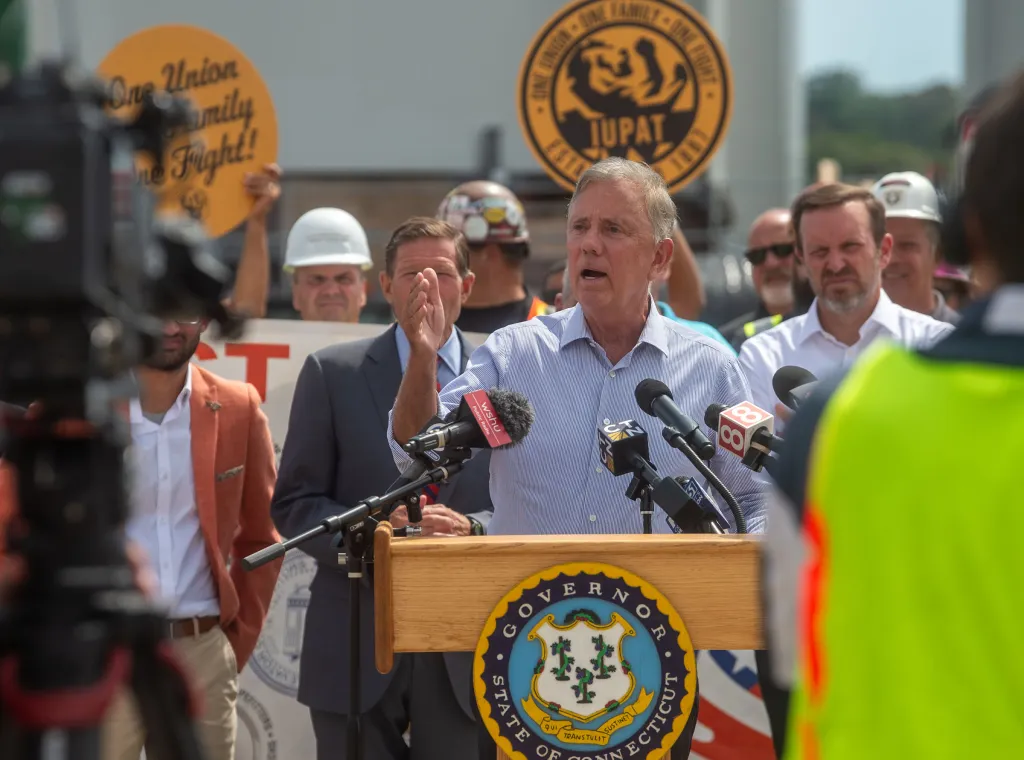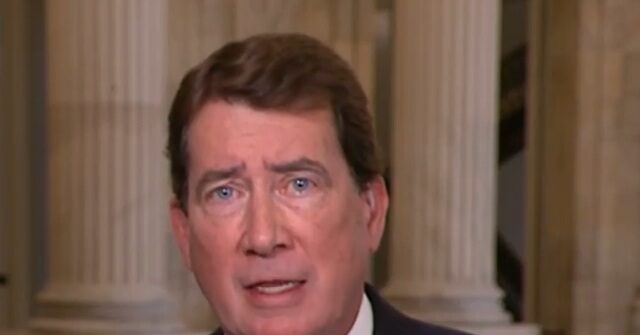
Attorney General William Tong told an appreciative audience of construction union leaders that Connecticut and Rhode Island were seeking a court order allowing resumption of work on the off-shore Revolution Wind project abruptly halted last month by the Trump administration.
“I will make news right now. We are moving, as we speak, for a preliminary injunction to overturn the stop-work order right now,” Tong told the Connecticut Building Trades Council convention at the Mohegan Sun casino, prompting applause.
Lawyers for the two states, which have contracts to purchase power to be generated by wind turbines off the Rhode Island coast, are filing in U.S. District Court in Providence for an injunction that would lift a federal stop-work order while the issue is litigated, Tong said.
The Trump administration issued the unprecedented order to stop work on a fully permitted, multibillion-dollar project that was initiated during Donald Trump’s first presidency and was 80% complete, promising the delivery of enough power next year to light 350,000 homes in Connecticut and Rhode Island.
Tong already had filed suit, but he said he had delayed seeking an injunction at the urging of Gov. Ned Lamont, a Democrat and former businessman who wanted to first attempt negotiation through contacts, most notably a former fellow governor, Douglas Burgum, who is Trump’s secretary of the interior.
The attorney general said he was acting with the consent of the governor, who told him he saw no sign of the Trump administration wanting to find a solution.
Lamont addressed the convention earlier Wednesday, complaining that the Trump administration was no closer to explaining in detail why it halted the project, other than vague claims of national security — or what it would take to lift the stop-work order, issued a week before Labor Day.
“I want to know: What does it take to get this thing open?” Lamont said. “Tell me what it is. Show me the ransom note.”
“Ransom note” was an unusually blunt reference, at least for Lamont, to the accusations that Trump is willing to use executive actions on one issue to force a concession on something else.
His administration halted a different wind project off New York until Gov. Kathy Hochul dropped her opposition to a gas pipeline sought by Trump.
“I’m a pretty patient guy. I work hard on relationships,” Lamont said. “I work hard on relationships in the Biden administration and the Trump administration. I have pretty good relationships with [the departments of] Energy and Interior and even in the White House down there.”
But Lamont said no one would articulate a reason for the shutdown of a project that had undergone exhaustive review before it was permitted to proceed under a lease from the federal government.
“You just can’t trust this administration. This administration is, in many ways, hostile to business. This is crony capitalism,” Lamont said. “We had a deal. I know that the president hates wind power. He’s been quite expressive on that subject. But we also know that a deal is a deal.”
Connecticut and Rhode Island filed suit in U.S. District Court on Sept. 4 in Rhode Island, opposing the stop-work order, stopping short of a demand for an injunction. Ørsted, the Danish company building Revolution Wind, filed a similar action in the District of Columbia.
The Trump administration defended the order this week in federal court in Washington, but Tong said it still has not identified specific reasons for a halting work after two years of a construction.
“The Order does not identify any violation of law, any imminent threat to safety, or any judicial decree requiring suspension,” Tong and Rhode Island Attorney General Peter F. Neronha wrote in their motion for an injunction.
House Minority Leader Vincent J. Candelora, R-North Branford, who also spoke at the convention, said in an interview after addressing delegates that he favored completion of Revolution Wind and that the Trump administration owed the public an explanation for halting it.
“I think when a government suspends a project they have an obligation to immediately state the grounds for that suspension, so that there could be corrective action and it could be moved forward,” Candelora said. “That project needs to be completed. It’s almost done.”
Candelora said he generally was wary about the cost of wind power, but he noted that Revolution Wind offered a relatively competitive price, unlike another wind project that Lamont had refused to support.
“I think stopping this project is unrealistic and will cause more harm in the long run,” he said.
Lamont said Ørsted is under pressure to continue the project or potentially lose access to specialty vessels leased for construction.
“I think we’ve got a little more time,” Lamont said. “But that’s measured in maybe weeks, not longer than that, days or weeks, actually.”
Mark Pazniokas is a reporter for The Connecticut Mirror (https://ctmirror.org/ ). Copyright 2025 © The Connecticut Mirror.



